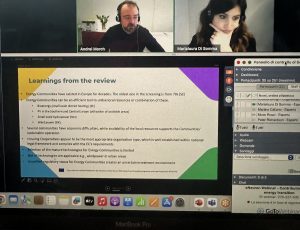Stakeholders, gathered in a webinar to present and discuss the project’s plans to optimize business models, planning and optimization of infrastructures to facilitate the path towards a decarbonized society.
This energy transition is driven by the need to reduce greenhouse gas emissions and mitigate the impacts of climate change. The burning of fossil fuels, such as coal, oil, and gas, are the largest sources of greenhouse gas emissions, which contribute to global warming and climate change.
Smart grids play a significant role in the energy transition by enabling the integration of renewable energy sources, improving energy efficiency, and supporting a more stable and reliable electricity grid.
The webinar was an excellent opportunity to share issues relating to smart grids and their impacts on the energy transition, as the possibility to integrate renewable energy sources, like solar and wind power, into the electricity system by providing real-time monitoring and control of the system and, therefore, supporting the balance of supply and demand of electricity, which is essential for the reliable and efficient integration of intermittent renewable energy sources.

You can read more on the full report here
Published on
08 May 2023



